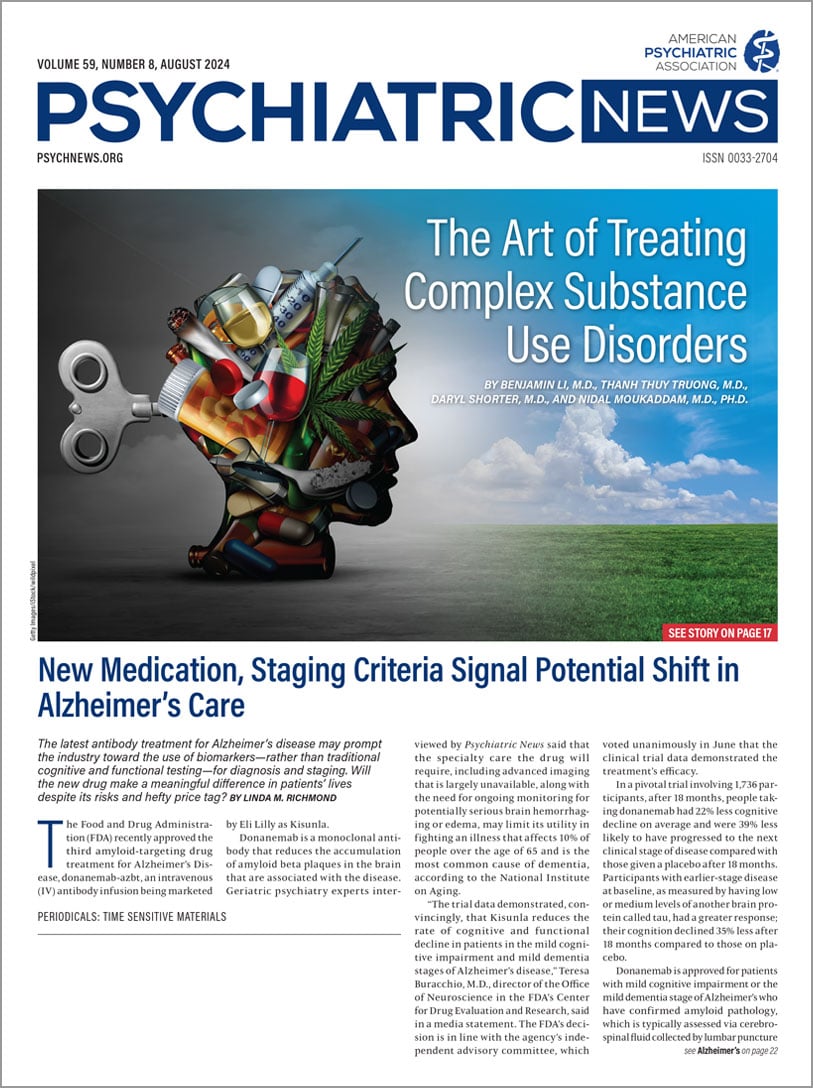The legal landscape concerning substance use disorder (SUD) can be fraught with twists and turns. At APA’s Annual Meeting in May, experts shared an overview of legal matters relevant to people with SUD and the health professionals who treat them.
Elie G. Aoun, M.D., an assistant professor of psychiatry at Columbia University, discussed how the concept of free will is woven into the legal system with respect to SUD and behaviors carried out while under the influence of drugs or alcohol.
“This … is the idea that people with an addiction don’t lose complete control over their behaviors, [and it is tied to] the concept of free will where a person is making a decision [to use substances] despite knowing the consequences,” Aoun said. He added that this line of thinking does not account for the way substances and SUD affect the brain, or how it processes information or regulates behavior.
On the other side is the determinism argument, which looks at whether the person’s behaviors are controlled by their underlying SUD, he explained.
Aoun described decisions rendered by the U.S. Supreme Court in the 1960s relevant to the debate. The first is Robinson v. California, wherein the Court in 1962 ruled that it is unconstitutional for a state to punish a person for having SUD when the person has not broken any laws involving drugs. The second is Powell v. Texas, in which the Court ruled in 1968 that although SUD is not a crime, actions committed while under the influence could be criminalized because the underlying decision to use the substance that led to the behavior is not the result of an “irresistible compulsion.”
Debra A. Pinals, M.D., an adjunct clinical professor of psychiatry at the University of Michigan Medical School, discussed correctional jurisprudence regarding SUD. She noted that 58% of state inmates and 63% of sentenced jail inmates had symptoms that met the criteria for SUD. Furthermore, 42% of state inmates and 37% of sentenced jail inmates were using substances at the time of their offenses, she said.
“There are lots of historical trends as to why this has come about,” Pinals said. “We know that the war on drugs … contributed to the idea of strict mandatory minimum sentences to punish the manufacture, use, and distribution of drugs.
“We are now in an era where we are more sympathetic to treatment,” Pinals added. “That doesn’t mean the pendulum has switched the other way [from punishment], but we are more sympathetic to the notion that treatment is a critical component [of the justice system for people with SUD].”
Pinals described several cases that emphasized inmates’ access to medications for opioid use disorder, as follows:
•
In 2018, Pesce v. Coppinger, the U.S. District Court for Massachusetts found that it is a violation of both the Americans with Disabilities Act and the Eighth Amendment to deny incarcerated people access to medications for opioid use disorder without an individual assessment and despite a professional’s determination that such medications are needed.
•
In 2019, in Smith v. Aroostook County, the First Circuit Court of Appeals ordered the Aroostook County Jail in Maine to provide one of its inmates access to her prescribed buprenorphine.
•
In 2021, P.G. v. Jefferson County, the U.S. District Court for the Northern District of New York found that it is a violation of the Americans with Disabilities Act and the Fourteenth Amendment to deny medically necessary methadone treatment to pretrial detainees.
Pinals also discussed the legal aspects of SUD for pregnant women. She described how 38 states have fetal homicide laws that protect fetuses by giving them victim rights when killed by violent acts against pregnant mothers, and what those laws could mean for women who use substances while pregnant.
“The mother is at risk of being charged with abuse and neglect of a child or with criminal acts [such as] murder,” she said. Laurence M. Westreich, M.D., an addiction psychiatrist and a clinical associate professor in the Department of Psychiatry at New York University, discussed SUDs and employer drug and alcohol testing. He outlined the reasons why employers test for substances, including safety, avoidance of liability, image, productivity, or legal requirements.
Westreich emphasized that employers who engage in random drug testing must have a way of ensuring that selection for testing truly is random.
“Otherwise, people will assume that they’re being discriminated against,” he said. “It’s common enough that someone will be tested randomly three times in a year and the person in the locker right next to him is not tested at all because that person’s number never came up. It will certainly seem to the guy who gets tested three times that he’s being singled out.” ■



